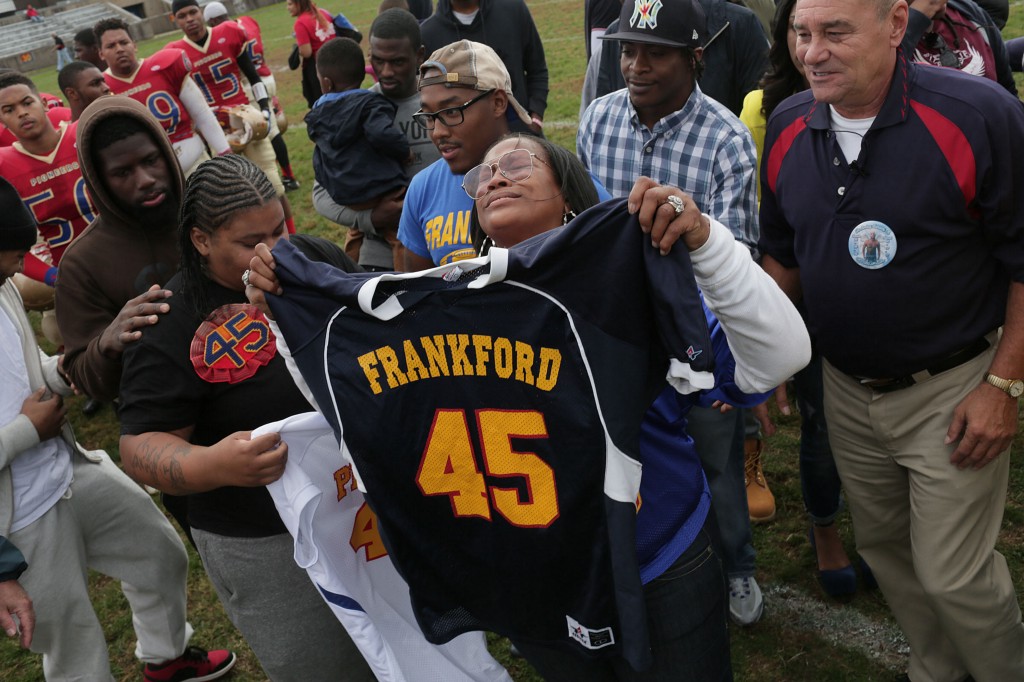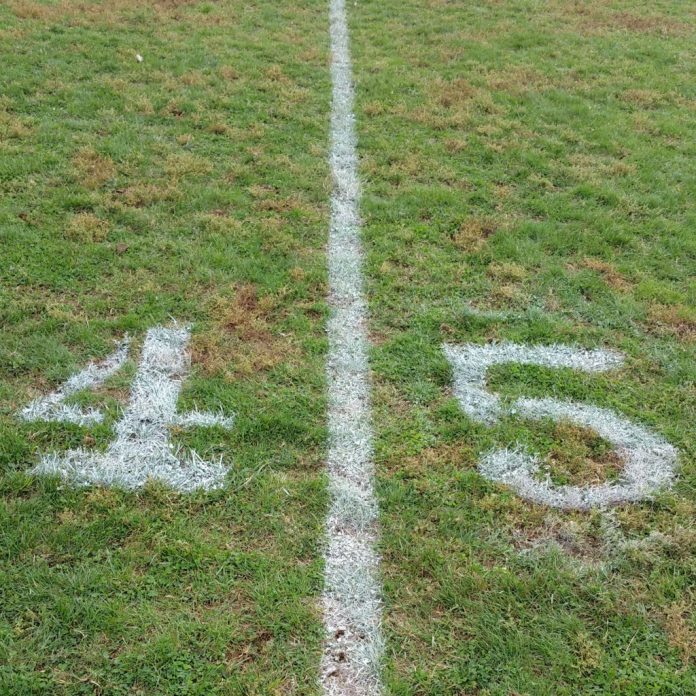The 45-yard lines at Frankford Stadium were painted on Saturday to honor Chris Spence, who was the first Pioneer player in program history to have his number retired. PHOTO COURTESY OF AMAURO AUSTIN
Frankford football has been around forever, and the Pioneers’ stadium shows it.
The rustic stands are cracked, the scoreboard unreliable and the playing surface worn, a patchy mix of green grass and brown dirt. The stadium is as old-school as the program, which, despite a long history of star players, had never retired an individual’s jersey.
That is, until Saturday. There was a football game played here this day, a non-league contest the Pioneers dropped to visiting Northeast, 35–18. But the day was about something different than those dimly-lit, flickering bulbs on the scoreboard.
Something more.
Fans showed up to watch a football game, sure, but the real reason they came was to support one of their own. The number 45 was painted in white chalk on each corresponding yard-line, an unusual quality for the antiquated stadium that struck the eyes the same way Chris Spence struck opposing players while he was alive.
In a halftime ceremony, Frankford retired Spence’s №45 jersey, but Spence himself could not be there to see it. The scenario was made possible due to tragic circumstances, as the 2008 Frankford graduate and former Philadelphia Daily News All-City linebacker and Player of the Year was shot and killed in February 2011 following an argument inside the T & T Lounge at Hawthorne and Margaret streets.
Frankford had never retired anyone’s number, but felt it fitting that nobody else should ever wear №45, not after the kid who donned it hit with such ferocity that it earned him the nickname “The Waterboy” after the popular Adam Sandler movie.
The ceremony was attended by family, friends, former teammates and retired Frankford head coach Mike Capriotti, who had the pleasure of coaching Spence.
“There will never be another Chris,” said his mother, Javese Phelps-Washington, who received her son’s jersey and cradled it through the ceremony. “He played one game where he hit a player so hard that the kid’s helmet went flying down the field. That was Chris. He was a small guy, but he hit like a beast.”
Spence came to Capriotti from the Frankford Chargers as a sophomore, mainly because the kids in the youth-level program were tired of getting hit so hard. He was an immediate starter at linebacker, while also playing running back and returning kicks. When Spence graduated, he attended a community college in Albany, New York, but struggled academically and returned home. One of the first things he did was come back to Frankford and help Capriotti coach the Pioneers. Shortly before Spence died, Capriotti was helping to get him enrolled at Thaddeus Stevens College in Lancaster. He was just 20 years old.
“Chris loved and he loved hard,” Phelps-Washington said through tears. “He lit up any room he was ever in. He was an intricate part in so many people’s lives. Some days are better than others, because he’s supposed to be here. He’s not supposed to be gone. But he lives on inside of me and through all of these people who loved him so much. This is his field. His spirit is all over this field.”
Capriotti, who retired after the 2010 season, recalled a story about how in 2007, the Pioneers had to forfeit a bunch of wins after it was discovered he had unwittingly used an ineligible player.
“I gave a speech about how sorry I was and how it was my fault,” Capriotti said. “But we still had some games to play. I told them if they didn’t want to come back out to practice I’d understand, but Chris rallied the team and made sure they all came out.”
Capriotti played at Frankford and coached there for 26 years, so he knows all about the program’s history.
“Normally, we don’t retire jerseys here, but the kids thought it was appropriate,” Capriotti said. “Of course I have no qualms with that. I still have his picture on my mantle. I know it meant a lot to his mom and everyone in the Frankford community.”
Capriotti said that if Spence didn’t realize his dream of making it to the NFL, he would have been a coach somewhere because of his natural leadership abilities.
“It was a worthy kid that we honored today,” said current head coach Will Doggett, who was Spence’s defensive coordinator under Capriotti. “He singlehandedly kept the team together when we forfeited those games. He wouldn’t let them quit. He was the kind of kid who always wanted more out of himself and those around him. He didn’t believe in giving up on anything.
“And he earned his nickname. One time I saw him hit a kid on Central so hard on a kickoff that he broke the kid’s arm. Even if we were down by 30 points, that’s how intense he always played. I had him in class, and even when he struggled, he wouldn’t quit on that, either. He always tried to better himself.”
When she received her son’s jersey at halftime, Phelps-Washington tilted her head toward the heavens and shouted his name.
“The day to me is bittersweet,” she said. “Football was his passion, and he loved the people he played with. Even after he came home from college, he would come and encourage these kids to go after their dreams. He wanted more for them. He never left Frankford behind in his heart. Frankford is what Chris loved.”
And Frankford loved him right back, bestowing an honor on Spence previously given to no one else. More star players undoubtedly will emerge from this program, but there will never be another Chris Spence, just like there will never be another Pioneer to wear №45.
“He personified Frankford football,” Capriotti said. “He was tough as nails.”
“If you ever met Chris,” Doggett said. “You’d never be able to forget him.” ••

Never forget: Javese Phelps-Washington, the mother of fallen Frankford football star Chris Spence, holds her son’s jersey in a Saturday halftime ceremony. Spence, who was shot to death in 2011, is the first player in Frankford history to have his number retired. KEVIN COOK / FOR THE TIMES





